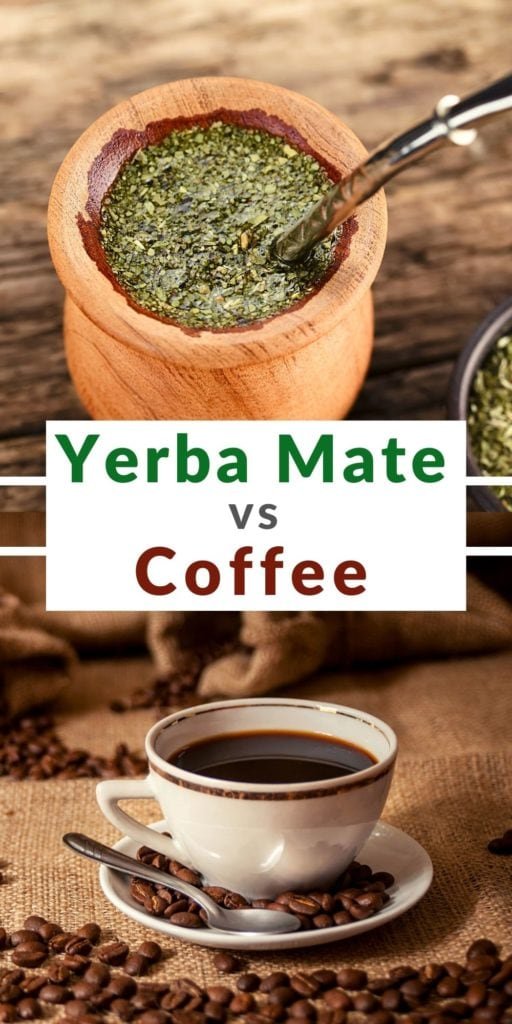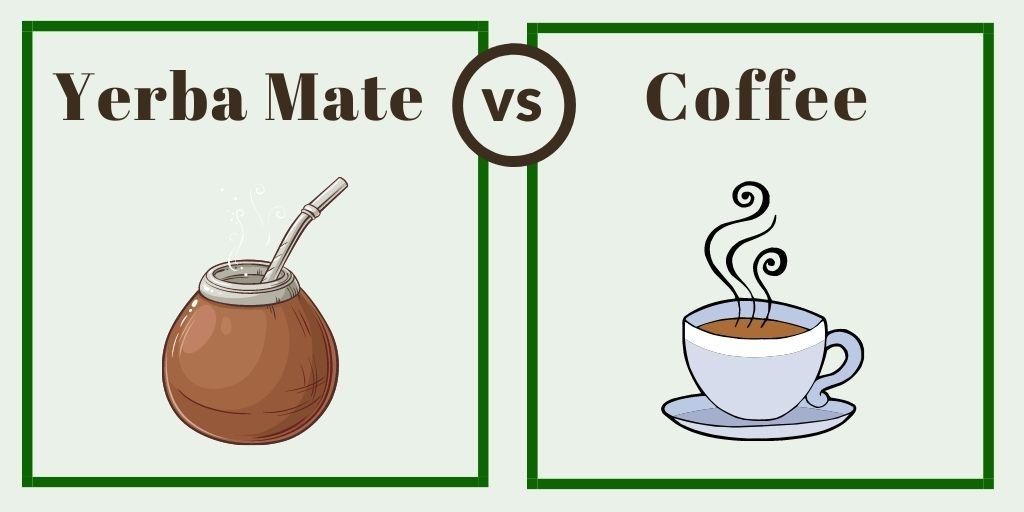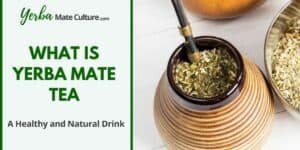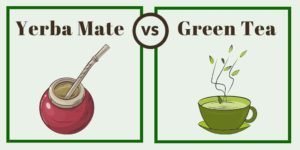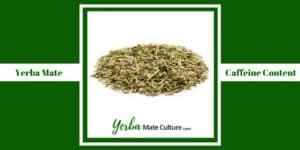It seems like many people are switching from drinking coffee to yerba mate tea. Or at least considering it.
I certainly did about a decade ago. I was suffering from acid reflux and found that quitting coffee helped a lot.
But I still needed something to keep me going through the workdays and intense exercise sessions after them. That’s when I discovered yerba mate and started drinking it instead of coffee.
But how does yerba mate taste if you are used to drinking coffee?
Maybe you are also wondering which one has more caffeine? Or if one is healthier than the other?
Now, let’s start our comparison of yerba mate vs coffee and I’ll answer all of these questions.
Yerba Mate and Coffee Basic Facts
Yerba mate is a traditional herbal tea that has been enjoyed in South American countries for centuries. It is made from the dried leaves of Ilex paraguariensis, a type of holly tree growing primarily in certain regions of Brazil, Argentina, and Uruguay.
This tea has now become very popular across the world due to its potential health benefits, energizing effect, and distinct flavor profile.
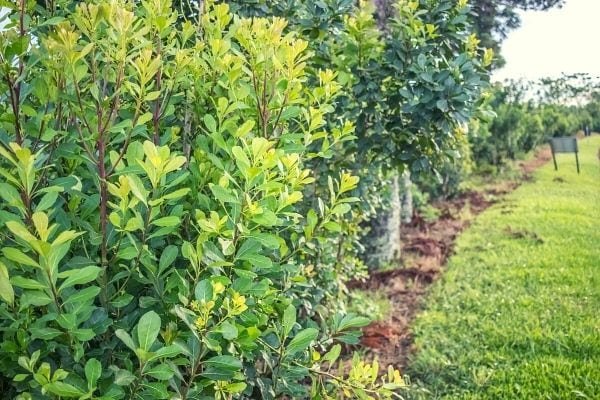
Coffee is a drink made out of the seeds acquired from different species of the coffee plant. The dried seeds, also called coffee beans, are roasted and ground to brew one of the most popular drinks in the world.
Coffee is available in various forms ranging from supermarket instant coffees to premium quality specialty coffees.
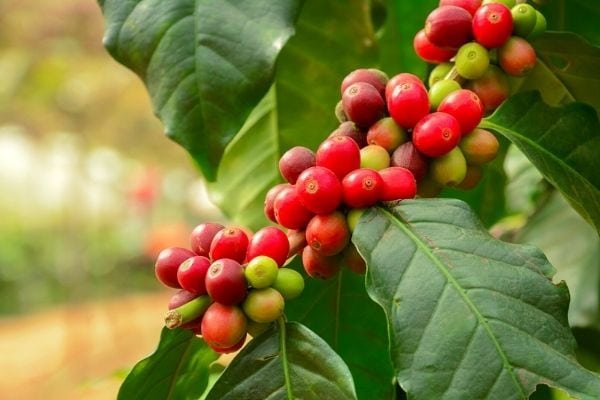
Brewing Yerba Mate
Yerba mate and coffee can actually be brewed in a very similar way, for example with using a French press. However, there are also many brewing methods that only apply to either one of these beverages.
Here are the most common methods for brewing yerba mate:
Traditional: Loose leaf yerba mate is added to a bowl (gourd) and hot water is then poured in. A kind of straw (bombilla) is used to drink the tea. This produces a very strong infusion with high caffeine content.
French Press: Preparing yerba mate in a French press is very convenient. Just add the yerba mate and some hot water and let steep for a while. Then pour into cups. This method allows you to easily adjust the strength of the tea by modifying the ratio of water and yerba mate and steeping time.
Tea Bags: Yerba mate tea bags are widely available and provide an effortless way of making a cup of tea at home or in the office. Using one tea bag results in a relatively mild infusion with a smooth taste and a low amount of caffeine.
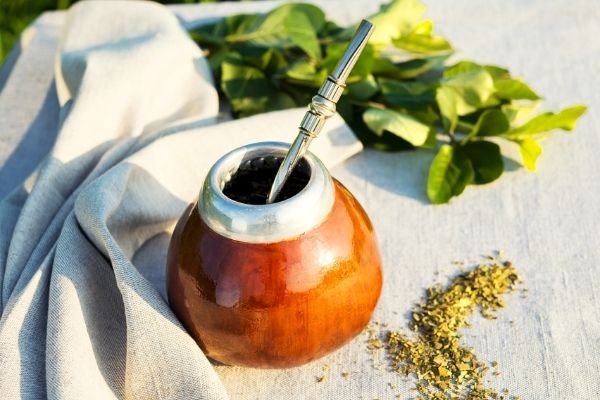
In addition, you can also make cold-brewed yerba mate tea, which is a very refreshing drink during hot summer days!
If you want to learn more, check out my complete guide for brewing yerba mate.
Brewing Coffee
As we all know, there are dozens of ways to make a cup of coffee.
Here are a few of the most popular coffee brewing methods:
Drip Coffee: Easy to make at home either by pouring hot water over coffee grounds placed in a filter or by using a basic coffee maker.
French Press: A great and inexpensive way to brew special coffee as well as typical coffees bought from the grocery.
Espresso: Produces a small amount of very strong coffee that can be enjoyed as it is or used as a base for numerous drinks such as cappuccino and caffè latte.

Of course, coffee can also be cold brewed and this has become quite a popular way of making it lately.
If you want to try something new, check out the Japanese Coffee Co online store and order some of their special sumiyaki coffee.
Taste
The taste of yerba mate tea and coffee are very different.
Yerba mate is often described as vegetal, bitter, and earthy. It is an acquired taste that might be overwhelming for first-timers.
Check out this article with some of the best yerba mate brands to find something that will suit your preference.
The taste of coffee can vary greatly depending on the species, terroir, and processing. A well-brewed cup will be balanced between bitter, acidic, and sweet. The flavors of coffee range from chocolate and nut to fruity and floral.
Yerba Mate Caffeine vs Coffee
You are probably looking for a quick answer to the question “Which one has more caffeine — yerba mate or coffee?”
In short, an average cup of coffee probably has more caffeine compared to yerba mate.
But it isn’t that simple.
The caffeine content of each beverage greatly depends on the following factors:
Type of Product: Species & variety, terroir & farming methods, processing.
Brewing Method: Product ratio to water, steeping time & grind size, water temperature.
To make things even more complicated, yerba mate contains two other stimulants in addition to caffeine. These compounds, called theobromine and theophylline, alter the effect of caffeine.
Drinking yerba mate can give you a nice energy boost that is more balanced compared to coffee. When I drink mate tea, I don’t experience the kind of jitteriness that I sometimes get from coffee. Also, the effect seems to be more smooth and last longer without a sudden crash.
How Much Caffeine Is in Yerba Mate?
Estimated amounts of caffeine per one cup of yerba mate tea depending on the brewing method:
- Traditional: 180 milligrams per cup
- French Press: 70 milligrams per cup
- Tea Bag: 30 milligrams per cup
How Much Caffeine Is in Coffee?
The average caffeine contents of different coffee drinks:
- Brewed Coffee: 120 milligrams per cup
- Espresso: 60 milligrams per shot
- Instant Coffee: 60 milligrams per cup
Below is an infographic with a comparison of the average caffeine content of yerba mate and coffee prepared with different methods:
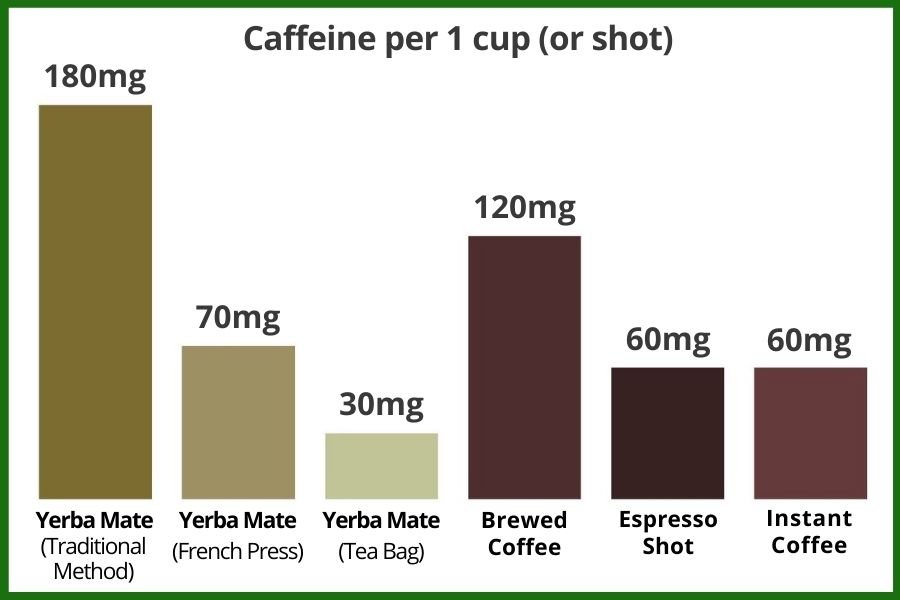
Note: The infographic presents only estimates of average amounts of caffeine per cup (or espresso shot). The strength of each type of drink can vary greatly as explained earlier.
Yerba Mate vs Coffee – Health Benefits
Both yerba mate and coffee are loaded with antioxidants and have many science-backed health benefits.
Let’s take a look at some different areas and see which one comes out on top.
Energy and Focus

Both drinks are excellent sources of caffeine and have a stimulating effect. This can help with increasing overall energy levels and cognitive function.
Having a cup of coffee or mate tea is likely to make you feel more awake and energetic.
However, the effects of these two uplifting drinks are a bit different due to the other compounds they contain (mainly the theobromine and theophylline in yerba mate).
I prefer yerba mate over coffee because I feel like it gives me better focus and the energy boost lasts longer. But ultimately, the choice depends more on your personal preference.
Weight Management

The stimulating effect of these drinks can make them an effective aid in losing weight. The main benefits are that both yerba mate and coffee increase metabolism and decrease appetite.
In addition, the energy boost that they provide promotes you to exercise for a longer time and with higher intensity.
A 2015 place-controlled study on anti-obesity effects of yerba mate had the subjects take capsules containing yerba mate for 12 weeks. An average of 3.6% decrease in body fat mass, a 3.0% decrease in body fat percentage, and 0.4% in the waist-to-hip ratio was recorded.
A 2019 study found that consuming 4 cups of coffee over a period of 24 weeks led to an average of 4% decrease in body fat mass.
There are many more studies with similar results on yerba mate and coffee.
This indicates that both yerba mate and coffee can be quite useful for burning fat and losing weight. With the current data, it’s impossible to say if one is more effective than the other.
Cardiovascular Health

A 2009 study suggests that consuming yerba mate may help with reducing bad cholesterol (LDL) and help in preventing cardiovascular diseases.
On the other hand, research also suggests that drinking a cup of coffee every day can reduce the risk of heart failure by 5%-12%.
Seems like both yerba mate and coffee provide some benefits in this area. But more research is needed to determine which drink is better for our heart health.
Antioxidants and Nutrients
Both yerba mate and coffee are great sources of polyphenols and other compounds that have antioxidant, anti-inflammatory, anti-cancer, anti-diabetes, and antihypertensive properties.
There is no comprehensive data available that compares the amounts of antioxidants found in each drink.
In addition to antioxidants, yerba mate is a good source of potassium, iron, and magnesium. It also contains plenty of important B vitamins such as vitamin B1 (thiamin) and B6.
While coffee also contains some potassium and magnesium, the amounts are not as high as in yerba mate. The same applies to vitamins. Coffee has various types of vitamin B but in lesser quantities compared to yerba mate.
How About Side Effects?
The possible side effects of both drinks are mainly related to their high caffeine content.
If you are sensitive to caffeine or consume too much of it you might experience the following:
- Insomnia
- Nervousness & restlessness
- Upset stomach & heartburn
- Nausea & vomiting
However, these side effects seem to be more common with coffee than yerba mate. This is probably related to the fact that coffee has more caffeine on average.
As mentioned earlier, yerba mate also contains other compounds that balance the effect of caffeine. In addition, coffee is more acidic than yerba mate and may aggregate symptoms of heartburn and acid reflux.
Yerba Mate vs Coffee FAQ
Does yerba mate have more caffeine than coffee?
On average, a cup of coffee has more caffeine compared to the same amount of yerba mate.
Yet, there are many different products available and they can be brewed in numerous ways that affect the caffeine content. Read this article to find more information about the caffeine in each beverage.
Is yerba mate healthier than coffee?
Looking at the recent research data, I would say that yerba mate tea is a healthier option.
However, this is not a simple yes or no question since both beverages have many proven health benefits. Both of them also have some possible adverse effects, especially if consumed excessively.
Should I swap coffee for yerba mate?
This is really a matter of personal preference. I recommend that you try both drinks in their different forms to find out what best suits your taste and makes you feel better.
Also, if you are consuming large amounts of coffee and experiencing some side effects, it might be a good idea to try yerba mate and see if it’s a better option for you.
What’s the Final Verdict?
Coffee and yerba mate are two very different beverages. While they both have caffeine, they taste very different and provide different sets of health benefits.
As mentioned earlier, quitting coffee for a while helped me get rid of acid reflux and IBS symptoms.
Since I have now somewhat recovered from these stomach problems, I frequently enjoy both drinks for their distinct taste and energizing effect. However, I still like to sip yerba mate more often because I feel like it’s easier on my stomach.
Whether you want to stick with coffee or take the step and try something new — a herbal tea called yerba mate — is entirely up to you.
Whichever you choose, I hope that you enjoy your drink!
Read next: Green Tea vs Yerba Mate
Save on Pinterest:
